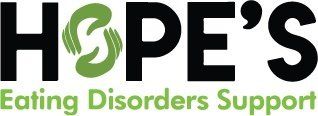Blog Layout
Tiktok's Influence on Eating Disorders and Body Image Disorders
Madison Hargreaves | July 6, 2020
The current pandemic has conducted a new way of living, which has quickly challenged people's adjustment skills. With this new lifestyle forcefully put in our laps, we have had opportunity to become quite familiar with the walls inside our homes; leaving much time to accumulate ways to satisfy never-ending boredom. Individuals have had to move their careers to home-base, leaving perhaps more flexibility and/or time with loved ones, while our younger generations are faced with needing to find a time-consuming activity or responsibility. The question is, how does one gain a sense of control in a time of uncertainty?
In 2018, Tik Tok, a social networking service advertising talent and comedy, made its debut in North America which began to capture views and time from most age groups. The need for this reported "addicting app" continued to grow, as did its "gone viral" dances and music catching the attention of adolescents, young adults, and even older generations. However, Tik Tok's two main themes, dancing and music, are deteriorating as topics of weight loss and so called "healthy routines" have begun to take the spotlight. Not only has this trend sparked a false importance of body image, it advertises unrealistic dieting behaviors and outcomes,leaving dangerous idealizations for those most vulnerable.
Unfortunately, the combination of this popular app, boredom, and the need for entertainment (due to our current pandemic), has been quite taxing for those struggling with body image issues and eating disorders. Consequently, the high usage of Tik Tok has developed more cases of eating disorders and body dysphoria, according to recent research. Why is this happening? Well, this more recent trend, ditching the common theme of dance and comedy, is individuals marketing their ideal weight loss routine including exercises, workout wear, and meal planning. This on -the- rise trend has caught the attention of those vulnerable to eating disorders and body image disorders; leaving consumers questioning what they consume, how they dress, and how their body compares to who they're watching. The toxicity of these comparisons puts the ideas in someone's head that "I should eat better.", "Why can't I look like that?", or "I wish I was able to do that". As a result, a sense of shame and a decrease in self-worth will corrupt the thought patterns and actions of those greatly influenced. It is important to note that these advertised routines do not suit the needs of all body and personality types as we humans, are uniquely built. We are not programmed to be the same!
Due to this systemic trend of fad weight loss, there is a struggle to reach the "ideal" in our diet culture, and it is compromising our mental and physical health. This dieting culture has been normalized and accepted by our current society which has implanted the idea that having body goals and achieving thin is what it means to be successful. I'm sure anyone reading this post has come across marketing schemes via television and on our social medias-- it's everywhere! Our most vulnerable populations are soaking in these harmful corruptions. Due to the overwhelm of our restricting standards, it can seem like constant work is needed to accomplish the perfect body. Continuously not being happy with ourselves and feeling the need to always be better has increased the eating disorder and body image disorder population. In the midst of all this chaos, please refer below to the following coping strategies.
Coping Strategies
1. Be aware of what accounts you come across and allow yourself to block what doesn't best serve you.
2. When having a first encounter with a particular video, use the following affirmations:
"I have been gifted my own body that is too unique to compare to anyone else's. I accept my body."
"My body will have particular needs that may not match someone else's."
"I appreciate my body for all it does for me!"
"I have the power to choose what is best for my body."
"I know what is best for my body and will fuel it to my desire."
3. Create a list of your best supporters. This circle of people allows you to be authentic, trusting, and open. To help this process, you can reach out to them individually and explain how you're feeling. You can also create a mind map (keep it in a spot you will remember) and in the center label it "My Circle" or "My Supporters". Have branches off the center naming the people you would consider your best options! When coming across a triggering profile or video, it helps to turn to a support so you can get what you're feeling off your chest and get grounded. Talking helps!
4. Meditation is a part of the mindfulness practice. Pick a quiet spot wherever you are and sit or lay down. You can turn on some quiet music or meditate in complete silence-- whatever is best for you! Use deep breathing, inhaling through the nose and exhaling out through the mouth. Allow yourself to calm the body and quiet the mind best you can. This takes practice! Focus on your affirmation of choice and give yourself the care you deserve. Be sure to meditate until you feel self-soothed and satisfied; where the mind is quieter and the nervous system has calmed. Try it!
References
Dempster, A. (2020). Tik Tok weight loss videos fueling eating disorders amid coronavirus lockdowns, health experts
say. ABC news, Retrieved from https://www.abc.net.au/news/2020-05-13/experts-concerned-tiktok-content-fuelling-eating-disorders/12215986
Lantos, E. (2020). Tik Tok: Fears videos may trigger eating disorders. BBC wales news, Retrieved from
https://www.bbc.com/news/uk-wales-52919914

By Conscious Commerce
•
28 May, 2021
With Children’s Mental Health week wrapping up today, I found myself reflecting upon change. Tomorrow marks 30 years I’ve been working in the field! The first 20 years were spent with Community Girls Home (a division of St Clair Child and Youth Services [SCCYS]) and an amazing group of women and adolescent females. The last 10 years, at our Kendall St site @ SCCYS. Throughout those 30 years, I’ve worked with some incredible people - some have retired, moved on to other agencies, and sadly, some have passed away much too soon. I continue to work with an amazing staff group at SCCYS and many others amongst our community partner agencies.

By Conscious Commerce
•
23 Apr, 2021
As COVID-19 cases rise and fall, one thing remains constant during the pandemic – the popularity of the social media platform TikTok. TikTok, a mobile app that allows users to create and share 15- to 60-second videos, is currently the most downloaded iOS app in the world with more than 850 million active users. According to 2021 Business of Apps statistics, 60 per cent of TikTok users are from Generation Z and spend an average of 52 minutes a day on the app.
For many of today’s youth, the app is simply a source of entertainment and social interaction. For others, the app can also be a source of harm.

By Conscious Commerce
•
26 Jul, 2019
1. The ways in which your beliefs and add to the behaviours about your own body and the bodies of others have been shaped by the forces of waiters and sexism. Then educate your children about (a) the genetic basic of difference in body types; and (b) the nature of the ugliness of prejudice. 2. Examine closely your dreams and goals for you children and loved ones. Are you over emphasizing beauty and body shape, particularly for girls? a. Avoid conveying an attitude which says in effect, “I would like you more if you lose weight, don't eat so much, look more like a slender model, fit into more sliver clothes, etc…” b. Decide what you can do and stop doing to reduce teasing, criticism, blaming, staring, etc… That reinforce the vilification of overweight and the glorification of slenderness. 3. Learn about and discuss with your sons and daughters, (a) the dangers of trying to alter one's body shape through dieting; (b) the value of moderate exercising toward stamina and cardiovascular fitness; (c) the importance of eating a variety of foods in well-balanced meals consumed at least three times a day. 4. Make a commitment to exercise for the joy of feeling your body move and function effectively to purge fat from your body or compensate for calories eaten. 5. Make a commitment not to avoid activities (such as swimming, sunbathing, dancing) simply because they call attention to your weight and shape. Similarly, refused to wear clothes that are uncomfortable or that you dislike, simply because they divert attention from weight and shape. 6. Practice taking people in general and women in particular, seriously for what they say, feel, and do, not for how slender or “well put together” they appear. 7. Make a commitment to help children appreciate and resist the ways in which television, magazines, movies, and other media distort the true diversity of human body types and imply that a slender body means power, excitement, and sexuality. 8. Make a commitment to educating boys about the various forms of violence against women, including weightism, and their responsibilities for preventing it. 9. Encourage your children to be active and do enjoy what their bodies can do and feel like. Do not limit their caloric intake unless a physician requests that you do this because of a medical problem. 10. Do whatever you can to promote the self respect of your daughters and nieces and sisters in intellectual, athletic, and social endeavours. Give the the boys and girls the same opportunities and encouragement. Be careful not to suggest that females are less important than males, example, by exempting males from housework and childcare. Oh well rounded self and solid self-esteem are perhaps the best antidote to mindless dieting and distorted eating.

By Conscious Commerce
•
26 Jul, 2019
Coping Mechanisms T o Improve Body Image • Put away your scale. • Dress to feel comfortable. • Draw attention to parts of your body you are proud of. • Walk proud. • Put away your skinny clothes. • Start the morning with good grooming. • Recognize that your thinking about your body may be distorted. • Realize you are not being singled out because you think you have gained weight. • Be comfortable and familiar with your body. To Cope with Eating • Set a routine – eat three well-balanced meals that are satisfying. • Make menus for a day ahead of time and post them. • Eat with people who support healthy eating. • Develop a support system for times when eating is a problem. • Plan things to do at times when other people are snacking. • Occupy yourself after a meal. • Walk away from the table after meals. • Plan healthy snacks. • Eat healthy foods instead of junk foods • Make a date to eat with someone. • Don’t buy binge foods. • Make a shopping list and stick to it. • Make sure to enjoy more about your meal than just the food. • Stay away from bathrooms after meals. • Start the day with breakfast. • Make decisions about eating and stick to them, make meals ahead of time • If you have trouble knowing when you are hungry, plan to eat regularly. To Control Urges to Binge • Work on hobbies and handcrafts. • Go for a walk. • Watch a movie. • Take a risk. Do something different. • Play with animals. • Don’t take extra money when you go out. • Take a nap. • Clean (for yourself, not for others). • Talk with someone supportive. • Avoid the kitchen when you walk in the door. • Listen to music. • Take a warm shower or bath. • Find something else to do. • Get away from your eating place. • Talk with someone else. You may or may not talk about your eating behaviors. • Nurture yourself even if you don't feel like it. • Try self-talk. Say you do not look any different than you did a few minutes ago. • Get yourself back on track with routine eating. To Improve Your Self-Esteem • Start the morning with self-care, grooming to feel your best. • Acknowledge your feelings. • Be creative (crafts, music, clothing, etc.). • Look back on awards and achievements. • Display a “brag wall.” • Keep a scrapbook or photo album handy to review proud moments. • Make a checklist of accomplishments. • Learn something new. • Become an expert at something and talk about it. • Assert your opinion when you feel confident. • Ask for help and support. • Allow yourself to be good enough, not perfect. • Accept compliments without reservations. • Take a healthy self-awareness or assertiveness class. To Tell Yourself You’re Okay • Set short term goals one day at a time. • Look at the positives of being away from your symptoms. • Anticipate good times and how you might handle bad times. • Forgive yourself. • Keep a diary and write your good and bad feelings. • Encourage yourself with self-pep talks. • Tell yourself that you are normal. • Tell yourself you need to eat to keep your energy level up. • Review your strengths. • Mark a calendar every day you keep symptoms in control and look back at your own improvement. • Allow yourself quiet time. • Get satisfaction from relationships rather than from food. • Tell yourself your number one priority is your health. To Deal with Feeling Isolated • Be a volunteer. • Go someplace where you can be with people even if you do not want to talk. • Call a supportive person. • Join in a group game. • Join an exercise class. • Make eye contact with people around you; smile and be open to others approaching you. • Plan activities with friends or family. • Read to someone else. • Develop a hobby and go to specialty meetings. • Join a choir or a band. Information gathered from the University of Wisconsin Psychiatric Institute and Clinic

By Conscious Commerce
•
26 Jul, 2019
You never have to feel uncomfortable in your own skin, here are twenty ways to keep reminding yourself that you are awesome. 1. Think of your body as the vehicle to your dreams. Honour it. Respect it. Fuel it. 2. Create a list of all the things your body lets you do. Read it and add to it often. 3. Become aware of what your body can do each day. Remember it is the instrument of your life, not just an ornament. 4. Create a list of people you admire: people who have contributed to your life, your community, or the world. Consider whether their appearance was important to their success and accomplishments. 5. Walk with your head held high, supported by pride and confidence in yourself as a person. 6. Don’t let your weight or shape keep you from activities that you enjoy. 7. Wear comfortable clothes that you like, that express your personal style, and that feel good to your body. 8. Count your blessings, not your blemishes. 9. Think about all the things you could accomplish with the time and energy you currently spend worrying about your body and appearance. Try one! 10. Be your body’s friend and supporter, not its enemy. 11. Consider this: your skin replaces itself once a month, your stomach lining every five days, your liver every six weeks, and your skeleton every three months. Your body is extraordinary—begin to respect and appreciate it. 12. Every morning when you wake up, thank your body for resting and rejuvenating itself so you can enjoy the day. 13. Every evening when you go to bed, tell your body how much you appreciate what it has allowed you to do throughout the day. 14. Find a method of exercise that you enjoy and do it regularly. Don’t exercise to lose weight or to fight your body. Do it to make your body healthy and strong and because it makes you feel good. Exercise for the Three F’s: Fun, Fitness, and Friendship. 15. Think back to a time in your life when you felt good about your body. Loving your body means you get to feel like that again, even in this body, at this age. 16. Keep a list of 10 positive things about yourself—without mentioning your appearance. Add to it daily! 17. Put a sign on each of your mirrors saying, “I’m beautiful inside and out.” 18. Search for the beauty in the world and in yourself. 19. Consider that, “Life is too short to waste my time hating my body this way.” 20. Eat when you are hungry. Rest when you are tired. Surround yourself with people that remind you of your inner strength and beauty. Hope’.

By Conscious Commerce
•
25 Jul, 2019
I used to feel betrayed by my body, like she was constantly trying to undermine every effort I made to change her. I always thought that if my body loved me, and was working for me, then why wouldn't she do what I wanted her to do? Why didn't she look the way I wanted her to look? I was never taught that she was on my side. My friends' bodies loved them it was so obvious. The girls I saw in the magazines had bodies that loved them, and probably so naturally too. They were always working for them in the ways mine wouldn't. I wanted my body to love me like that. If she loved me, she would listen to my pleas to be anything other than what she was. I spent so many years believing that my body hated me - and I hated her, too. No matter how much effort I put in, it felt like my body could never get it right. It wasn't easy for me to realize how much my body really loved me. All the times she was “working against me”, were really her efforts to keep me going. The years I spent depriving her of her needs to be something she couldn't be eventually led to the realization that she was always loving me - but I wasn't loving her back. Loving my body meant loving myself, and sometimes that's a hard thing to do. Self-love is like taking care of a plant; you see that it's not getting enough sunlight so you put it in a new spot, you see that the soil is dry so you give it some water to help it survive. Our bodies are the same; they're just giving us more complicated signals. When your body is talking to you, try your best to listen. It's not easy, but every little bit gets you closer to appreciating that our bodies are working so hard to keep us going. Take the time to engage in self-care activities, even if it is something as simple as picking something you are glad your body does for you. Self-love is all about you, and that can be a hard concept to grasp. It’s finding things that make your heart feel a little more full. It’s being soft with yourself throughout the process, and knowing self-love means something different for everyone. For me, it started with listening to how my body was reacting to situations I was in: how did my heart feel when I was with certain people and doing certain things? From there, it grew to an understanding of what (and who) made my heart happy. One of the many reasons I got involved with NEDIC is because they’re advocates for the concept of self-love while providing individuals with the tools to support themselves and others. A form of self-love for me is supporting others, and volunteering here has given me the tools to do so. Being a part of this organization has given me a better understanding and appreciation for my body and what it does for me. The work that NEDIC does deserves more credit, just like our bodies do. You deserve all the love you give to people around you, self-love is necessary and your body is an alarm clock reminding you to check in with yourself. Kate is an Outreach and Education Volunteer at NEDIC and a Family Centre volunteer at CAMH. She’s passionate about self-care and is a mental health advocate. She hopes to apply for her Masters of Social Work in the fall. Originally posted on: NEDIC - written by Kate
© 2024
All Rights Reserved | Hope's Eating Disorders Support | Created by M.A.P | Powered by Conscious Commerce Corporation

